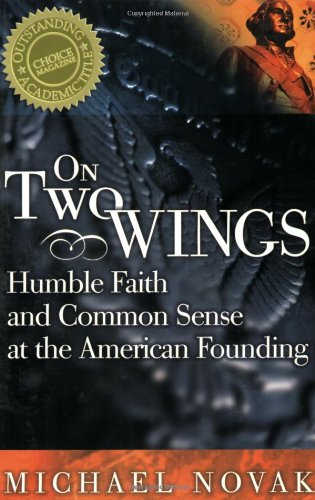On Two Wings: Humble Faith and Common Sense at the American Founding
₱1,459.00
Product Description
The leaders of the American Revolution, unlike the leaders of the French revolution, did not set out to erase religion. Indeed, the very first act of the Continental Congress was to pray to Divine Providence in the face of the British bombardment of Boston. In establishing a new model of self-government, the Founders believed that they were not only acting according to reason and common sense, but also obeying a religious duty. Benjamin Franklin proposed as their motto: Rebellion against tyrants is obedience to God.”
In telling the story of the forgottenif not deliberately ignoredrole of faith in America’s beginnings, Michael Novak probes the innermost religious conviction of Washington, Jefferson, Madison and other of our Founders. He shows that while the American eagle could not have taken flight without the empirical turn of mind embodied in John Locke’s teaching on the ends of government and the consent of the governed, the men who made America also believed that liberty depends as much on faith as on reason.
In the course of his illustrious career, Michael Novak has written several prize-winning books on theology and philosophy. In
On Two Wings he has created a profound mediation on American history, and on human nature and destiny as well.
Review
From Amazon: “In one key respect, the way the story of the United States has been told for the past one hundred years is wrong,” writes Michael Novak. “To read most philosophers and historians of the American polity today is to learn that America is an historical embodiment of secular philosophy, the Enlightenment.” Nothing could be further from the truth, says Novak, who sets out to demonstrate just how important religious faith was to the founders. He makes a spirited case, noting, for example, that the very first act of the First Continental Congress, in 1774, was to make a public prayer. Of the 3,154 “citations in the writings of the founders,” 34 percent are to the Bible. He provides dozens of similar examples. On Two Wings does not proceed as a traditional narrative; Novak favors extensive block quotations from his sources and conveys a whole chapter in question-and-answer format. In addition, a major part of the book is an appendix that provides brief sketches of the lesser-known founders. What the book lacks in narrative elegance it makes up for in forceful argument– it pulls off the trick of being both brief and thorough. Readers who admire Founding Brothers by Joseph Ellis will appreciate this book, especially if they are religiously inclined. –John Miller –This text refers to the Hardcover edition.
From Libary Journal: Novak (religion and public policy, American Enterprise Inst.; Belief and Disbelief) argues that religion played a central role in the lives of, and the documents by, the founders of the American republic. He further attempts to show how Washington, Jefferson, Madison, and others had in common a “humble faith.” He is most convincing when presenting evidence that biblical language and allusions permeated the writings of these leaders but is less successful in showing that the religion they thought useful for others also held personal importance for them. The book is weakened by a definition of religious faith so broad that “humble faith” becomes merely religious sensibility. Novak is clearly passionate about his topic, but he relies heavily on secondary works, so that at times this is more of a summary than an addition to the topic. Useful for collections seeking differing viewpoints on American history. Jan Blodgett, Davidson Coll., NC Copyright 2001 Reed Business Information, Inc. –This text refers to the Hardcover edition.
The U.S. isn’t officially Christian, but Novak demonstrates that the men who created it rooted the country conceptually in the Bible. The characterizations of God in the Declaration of Independence derive from the Hebrew Scriptures (Old Testament), probab
About the Author
In 19














